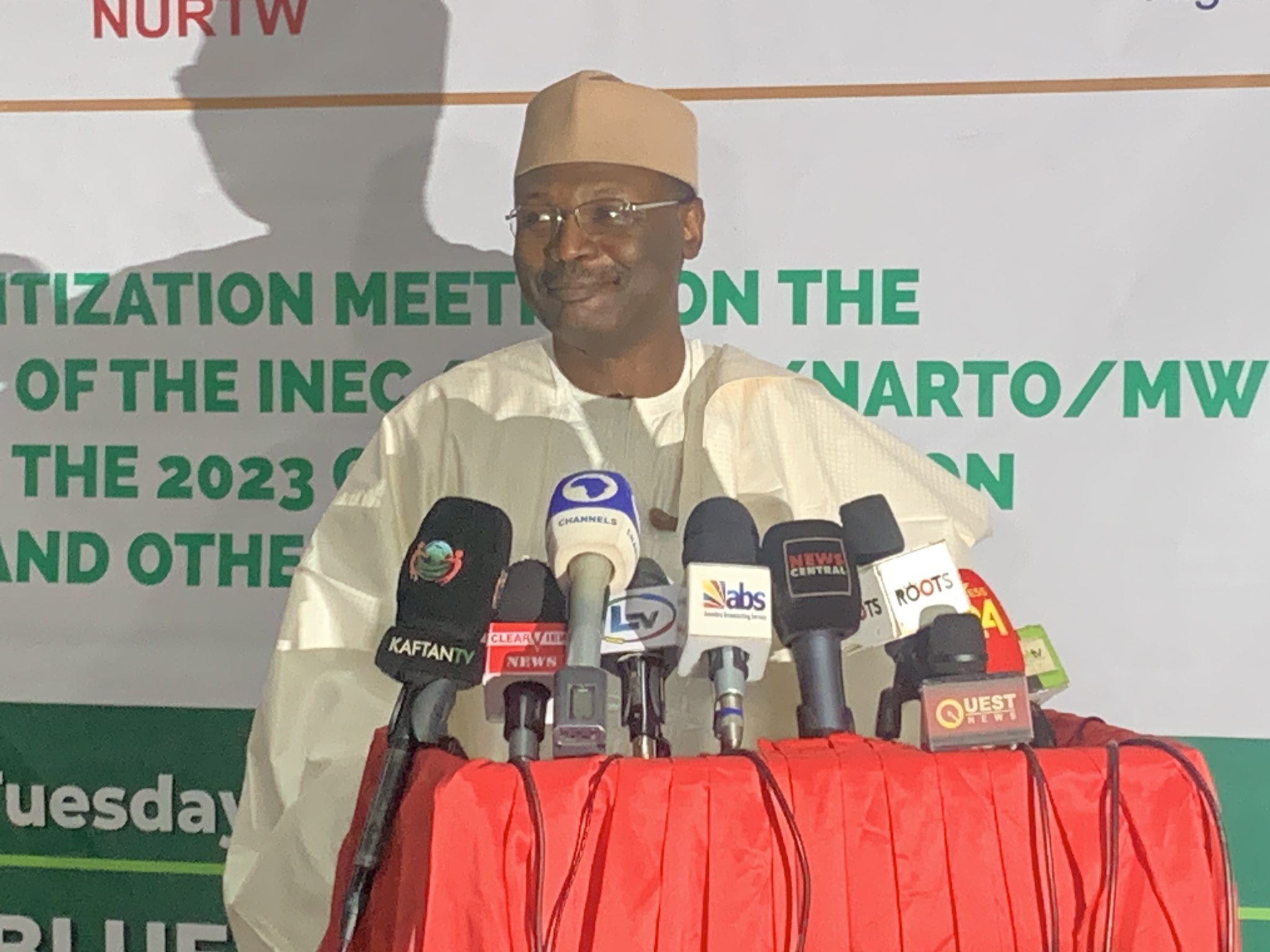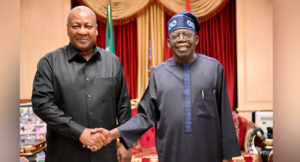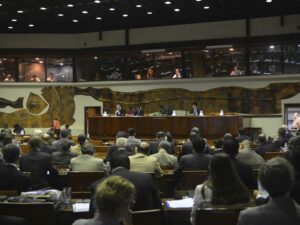
Ten days to the February 25 presidential and National Assembly election, cash for the mobilisation of ad-hoc staff for the polls is yet to be made available to the Independent National Electoral Commission (INEC), Daily Trust reports.
Nigerians have been battling with the scarcity of naira notes following the redesign of N200, N500 and N1000 notes by the Central Bank of Nigeria (CBN).
Meanwhile, the Supreme Court will today continue hearing the suits by three state governments challenging the implementation of the currency swap deadline.
The Supreme Court had on February 8 restrained the federal government from enforcing the cash swap deadline of the Central Bank of Nigeria (CBN) following the suit by the governments of Kaduna, Kogi and Zamfara states challenging the currency policy.
The Chairman of INEC, Prof. Mahmood Yakubu, had penultimate Tuesday met with the governor of the CBN, Godwin Emefiele, where he requested concessions regarding the naira redesign policy with specific reference to the limitations placed on cash withdrawals and the need to make some cash available for some peculiarities that cannot be met with electronics transfer of monies.
Emefiele had while responding, said he would ensure the CBN is not seen as an agent used to thwart the forthcoming general election, assuring that the apex bank would provide INEC needed naira notes as required.
But, an indication emerged that the new notes have not been made available to the electoral body ahead of the election when the Resident Electoral Commissioner for the Federal Capital Territory (FCT), Alhaji Yahaya Bello, raised the issue.
Bello said the ability of the INEC to conduct the general election may be hampered by the CBN’s cashless policy.
Speaking in Abuja at the North-Central stakeholders’ roundtable on the 2023 general elections, organised by the Centre for Transparency Advocacy (CTA), he said the commission needs cash to enable it to coordinate security and logistics, and that the scarcity of the naira may affect this.
He said that if nothing was done to address the cash crunch caused by the policies, INEC in the FCT and across the country would find it difficult to deploy staff and materials for the election as most of the services required cash to obtain.
He, however, said that apart from the cash challenge, the commission was prepared for the elections as it had taken delivery of 80 per cent of materials for the polls and trained staff ahead of the February 25 and March 11 elections.
“Before election day, we are going to deploy the service providers. On the night of Friday (the day before the election) in the FCT, we have more than 12, 000 ad-hoc staff that we are going to give cash to.
“None of them will receive a cheque or accept a transfer. I am talking about FCT (12,000), which will require about N5,000 (each) cash on Friday night. Also, those who are going to transport our men, materials and security to the polling units will need cash to do that.
“Also, you will not take a security person to a polling unit from morning till evening without giving him money to eat and I don’t think you expect him to go to the POS to withdraw the N1,000 you are going to give him,” he said.
He, however, said that INEC was in discussions with the CBN to see how the problem could be addressed.
He said, “This policy does not affect only INEC FCT in particular. It is going to affect the whole commission nationwide. So, the chairman of the commission, Prof. Mahmood Yakubu met with the CBN governor, they also consulted and briefed the National Council of States and the Presidency.
“This is an issue that is being tackled at the highest level because it affects the whole election generally. For now, we are going to wait for the outcome of the negotiations and discussions that are ongoing. So that we will know exactly what is going on.”
Speaking earlier, the Executive Director of the CTA, Faith Nwadishi, said the centre, which is an accredited election observation group, will deploy 2000 observers across the country to cover the 774 local government areas during the 2023 general elections.
Meanwhile, Emefiele has insisted that there was no need to shift the February 10 deadline for recognising the old naira notes as legal tender.
He stated this during a visit to the Federal Ministry of Foreign Affairs on Tuesday to discuss the monetary and currency redesign policy of the apex bank.
The comment by Emefiele is coming against the backdrop of the recent ruling by the Supreme Court, which temporarily restrained the CBN from enforcing the February 10 deadline for the naira swap.
“The situation is substantially calming down since the commencement of over-the-counter payments to complement ATM disbursements and the use of super-agents. There is, therefore, no need to consider any shift from the deadline of February 10,” he said.
He further said the effective implementation of the naira redesign policy could cut off 4 per cent from the current inflation level of 21.34 per cent.
Emefiele also accused some politicians of “buying” the new notes and hoarding them.
“Some of our leaders are buying the new notes and storing them for whatever purposes. I will not be direct here,” he said.
He further explained that the optimal volume of cash in circulation should be around N700 billion.
He said: “Even if we say N1trillion should be in circulation, we cannot refloat N3.7trillion into circulation.”
Emefiele also said that Point of Sale (POS) agents who charge above N200 for the CBN cash swap programme will be arrested and jailed when caught.
He further added that the POS operators can come to the CBN to be compensated for any extra cost incurred in getting the new notes rather than charging a higher fee on customers.
Reacting, Femi Falana, human rights lawyer, said the CBN was wrong for not obeying an order of the Supreme Court suspending the implementation of the February 10 deadline on the old naira notes.
In an interview with Channels Television on Tuesday, Falana said CBN has a responsibility to direct commercial banks to comply with the order of the court.
“In a country where the rule of law operates, once the Supreme Court has determined a matter or given an order, it is expected that all and sundry – everybody – will comply with the order,” he said.
The Senior Special Assistant to the President on Media and Publicity, Malam Garba Shehu, said the position of the government and the CBN would be made known upon the determination of the suit coming up today.
Shehu, in a text message, said: “Following series of enquiries, we wish to state it is not true that the Federal Government or the Central Bank of Nigeria, CBN, have taken a preemptive action on the legality of currency as a legal tender in view of the pendency of the case before the Supreme Court.
“The position of the government and the CBN will be made known upon the determination of the suit coming up tomorrow (today).”
The Supreme Court will today continue hearing the suits by Kaduna, Kogi and Zamfara states challenging the currency policy.
The apex court ordered the federal government to maintain the use of old notes of N200, N500, and N1000 pending the determination of the substantive motion on February 15.
The office of the Attorney General of the Federation (AGF) had also filed an objection challenging the jurisdiction of the apex court to entertain the motion contending that under Section 251(1)(a)(p)(q) & (r) of the Constitution only the Federal High Court has exclusive jurisdiction on such matters.
However, more states have filed fresh motions before the apex court challenging the currency swap deadline policy.
Kano State, in its motion filed on Thursday, February 9, through their counsel, Sunusi Musa (SAN) wants the apex court to declare that the decision of the president in the exercise of his executive powers to unilaterally approve the CBN redesigning and implementation of the demonetisation economic policy that limits cash withdrawal affects 20 million citizens in the state.
The state further contends that by the combined reading of Section 148(2) of the Nigerian Constitution of 1999, the president cannot unilaterally implement cash policy without the approval of the Federal Executive Council and the National Economic Council, respectively.
On the same day, the Ondo State government filed an originating summons asking the Supreme Court to stop the implementation of the federal government’s directive to the CBN on the limitation of daily cash withdrawals from banks.
The state said the policy has economic and commercial activities in the state.
Similarly, the Ogun State government on February 13 filed an application at the Supreme Court seeking a nullification of the federal government’s currency redesigning and swap policy for causing residents in the state to be stranded, cash strapped and frustrated leading to riots, grievous interruption of commercial activities and a gradual economic downturn in the state.
The state contends that the CBN is not in compliance with the provisions of Section 20(3) of the Central Bank of Nigeria Act, 2007 and the extant laws in Ogun State and that the state is not “One of the constituent members of the Federation recognized under the provision of Section 3 (1) of the Constitution of the Federal Republic of Nigeria, 1999 (as amended).”
Meanwhile, a Federal High Court in Abuja has fixed February 25 for the hearing of the suit by an Abuja-based lawyer, Malachy Nwaekpe Esq seeking to nullify the federal government’s currency policy.







